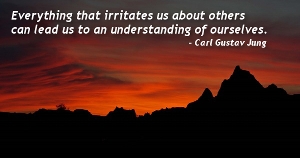Quotes by Carl Gustav Jung
In the second half of life the necessity is imposed of recognizing no longer the validity of our former ideals but of their contraries. Of perceiving the error in what was previously our conviction, of sensing the untruth in what was our truth, and of weighing the degree of opposition, and even of hostility, in what we took to be love.
– Carl Gustav Jung
If I accept the fact that a god is absolute and beyond all human experiences, he leaves me cold. I do not affect him, nor does he affect me. But if I know that a god is a powerful impulse in my soul, at once I must concern myself with him, for then he can become important… like everything belonging to the sphere of reality.
– Carl Gustav Jung
Far from being a material world, this is a psychic world, which allows us to make only indirect and hypothetical inferences about the real nature of matter. The psychic, alone has immediate reality, and this includes all forms of the psychic, even “unreal” ideas and thoughts which refer to nothing “external.” We may call them “imagination” or “delusion,” but that does not detract in any way from their effectiveness. Indeed there is no “real” thought that cannot, at times, be thrust aside by an “unreal” one, thus proving that the latter is stronger and more effective than the former. Greater than all physical dangers are the tremendous effects of delusional ideas, which are yet denied all reality by our world-blinded consciousness. Our much-vaunted reason and our boundlessly overestimated will are sometimes utterly powerless in the face of “unreal” thoughts. The world powers that rule over all mankind, for good or ill, are unconscious psychic factors, and it is they that bring consciousness into being and hence create the sine qua non for the existence of any world at all. We are steeped in a world that was created by our own psyche.
– Carl Gustav Jung
The source of numerous psychic disturbances and difficulties occasioned by man's progressive alienation from his instinctual foundation, i.e., by his uprootedness and identification with his conscious knowledge of himself, by his concern with consciousness at the expense of the unconscious. The result is that modern man can know himself only in so far as he can become conscious of himself--his consciousness therefor orients itself chiefly by observing and investigating the world around him, and it is to its peculiarities that he must adapt his psychic and technical resources. This task is so exacting, and its fulfillment so advantageous, that he forgets himself in the process, losing sight of his instinctual nature and putting his own conception of himself in place of his real being. In this way he slips imperceptibly into a purely conceptual world where the products of his conscious activity progressively replace reality. Separation from his instinctual nature inevitably plunges civilized man into the conflict between conscious and unconscious, spirit and nature, knowledge and faith, a split that becomes pathological the moment his consciousness is no longer able to neglect or suppress his instinctual side.
– Carl Gustav Jung
